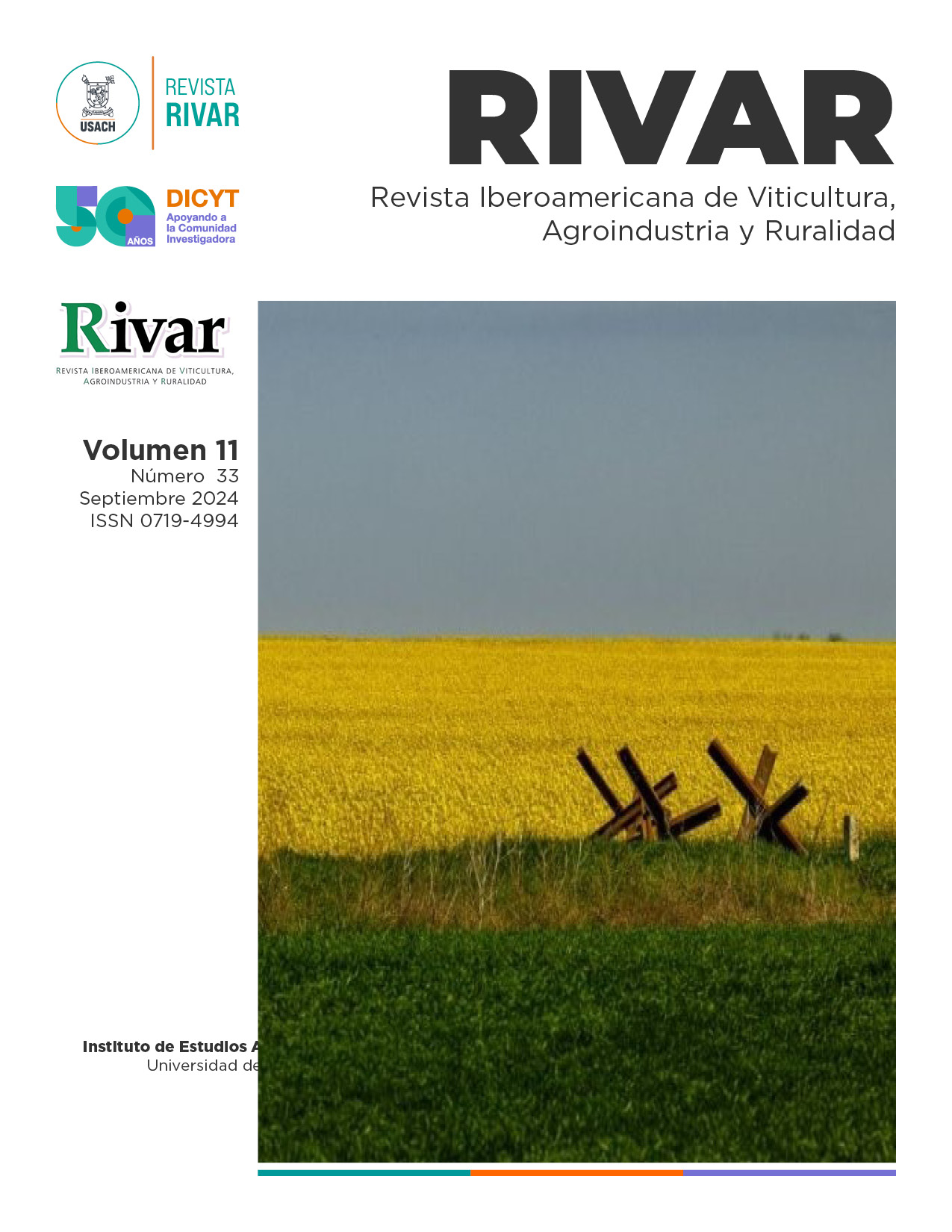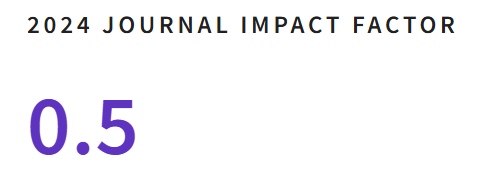Modelo cuadrático para evaluar el impacto de Covid-19 en las habilidades blandas de recursos humanos
DOI:
https://doi.org/10.35588/rivar.v11i33.6221Palabras clave:
modelo cuadrático, Covid-19, recursos humanos, habilidades blandasResumen
Presentamos un modelo cuadrico como mecanismo para evaluar las consecuencias del impacto del Covid-19 en las habilidades sociales del potencial de recursos humanos en Ucrania. El modelo calcula los resultados y destaca la importancia de dedicar recursos a la actualización de habilidades blandas, considerando el trabajo a distancia, el proceso de transformación digital actual y los cambios en los requisitos laborales que surgieron durante la pandemia Covid-19. Fueron utilizados indicadores específicos, relacionados con la influencia de las habilidades blandas de personas que trabajaron durante la pandemia Covid-19, y se formaron 24 indicadores numéricos relacionados a las habilidades sociales de los empleados. El cálculo del indicador integral se basa en una encuesta realizada a cien empleados de de diez empresas. Para ello, se utilizan procedimientos analíticos con medios técnicos de información con soporte de Microsof Excel, mediante correlación cuadrática y análisis de regressão, seguidos de la formación de una línea de tendencia polinómica de cuarto grado. Os resultados do análise confirmam o surgimento dos cenários potenciais que se han vuelto factibles en medio de la pandemia. Por diversas limitaciones, los empleados se han visto en la obligación de adaptar y mejorar sus competencias y otras habilidades en comunicación remota, para poder tomar decisiones informadas en torno a la gestión empresarial y a actividades económicas.
Descargas
Referencias
Agrawal, S., De Smet, A., Poplawski, P. and Reich, A. (February 12, 2020). Beyond Hiring: How Companies are Reskilling to Address Talent Gaps. McKinsey and Company. https://www.mckinsey.com/business-functions/organization/our-insights/beyond-hiring-how-companies-are-reskilling-to-address-talent-gaps.
Bataklar, S. and Toy, Z. (2023). Soft Skills Acquisition for Engineering Undergraduates in Turkey: A Soft Skills Course Design. International Journal of Social Sciences and Education Research, 9, 115-125. https://doi.org/10.24289/ijsser.1260896
Chen, T. (2023). A Comparison of Economic Impact in US: Covid-19 and Ukraine Conflict. BCP Business & Management, 40, 292-299. https://doi.org/10.54691/bcpbm.v40i.4393
Chumachenko, D., Pyrohov, P., Meniailov, I. and Chumachenko, T. (2022). Impact of War on Covid-19 Pandemic in Ukraine: The Simulation Study. Radioelectronic and Computer Systems, 2, 6-23. https://doi.org/10.32620/reks.2022.2.01
Gnecco, G., Landi, S. and Riccaboni, M. (2023). The Emergence of Social Soft Skill Needs in the Post Covid-19 Era. Quality & Quantity, 58, 647-680. https://doi.org/10.1007/s11135-023-01659-y
Gopika, J. and Rekha, R. (2023). Awareness and Use of Digital Learning Before and During Covid-19. International Journal of Educational Reform https://doi.org/10.1177/10567879231173389
International Labour Organization (December 17, 2020). Overcoming the Soft Skills Gap and Covid-19 Challenges for Women Factory and Office Workers. International Labour Organization. https://www.ilo.org/manila/public/pr/WCMS_764520/lang--en/index.htm
Juhász, T., Horvath-Csikos, G. and Gáspár, T. (2023). Gap Analysis of Future Employee and Employer on Soft Skills. Human Systems Management, 42(5), 527-542. https://doi.org/10.3233/HSM-220161
Manyika, J., Lund, S., Chui, M., Bughin, J., Woetzel, J., Batra, P., Ko, R. and Sanghvi, S. (2017). Jobs Lost, Jobs Gained: What the Future of Work Will Mean for Jobs, Skills, and Wages. McKinsey and Company. https://www.mckinsey.com/featured-insights/future-of-work/jobs-lost-jobs-gained-what-the-future-of-work-will-mean-for-jobs-skills-and-wages
Martyniuk, V., Sokil, O., Lančarič, D. and Tsygylyk, N. (October 21 and 22, 2021). Corporate Social Responsibility’s Impact on the Development of Small and Medium-Sized Businesses in the Region: The Study of the Food Sector of the Lviv Region in Ukraine. In Proceedings of the VIII International Scientific Conference Determinants of Regional Development, 2 (pp. 221-233). Piła, Poland.
Martyniuk, V., Tsygylyk, N. and Skowron, S. (2021). The Impact of The COVID-19 Pandemic on Key Indicators of Personnel Security: A Study With Neural Network Technologies. European Research Studies Journal, 24(2): 141-151.
Mona, N. and Kawilarang, J. (2022). Digital Media Literacy During Covid-19 Pandemic Era among Millenials. Proceedings Of International Conference On Communication Science, 2(1), 115-124. https://doi.org/10.29303/iccsproceeding.v2i1.74
Musnandar, A. (2021). Soft Skills from Islamic Perspective for Maximal Students’ Learning Achievement. At-Turats, 14(2), 176-187. https://doi.org/10.24260/at-turats.v14i2.1856
Podavale, A., Malysh, N., Kuzmenko, O., Zadorozhna, V., Kolomiets, S. and Chemych, O. (2023). Influence of Meteorological Factors on Covid-19 Incidence in the Conditions of Ukraine. Bangladesh Journal of Medical Science, 22(2), 385-391. https://doi.org/10.3329/bjms.v22i2.65000
Podolchak, N., Martyniuk, V., Tsygylyk, N., Skowron, S. and Wołowiec, T. (2022). Mitigating Risks for Effective Personnel Management in the Organization of the Energy Sector due to the COVID-19 Pandemic. Sustainability, 14(16), 10055. http://dx.doi.org/10.3390/su141610055
Podolchak, N., Tsygylyk, N., Martyniuk, V. and Sokil, O. (September 5 to 17, 2021). Predicting Human Resource Losses due to the COVID-19 Pandemic in the Context of Personnel Security of Organizations. In 11th International Conference on Advanced Computer Information Technologies (ACIT) (pp. 333-336). Deggendorf, Germany. http://dx.doi.org/10.1109/ACIT52158.2021.9548361
Ryleeva, A., Khomutnikova, E. and Emanova, S. (2022). Developing Soft Skills in High School Students Using Digital Tools. Science for Education Today, 12(1), 77-98. https://doi.org/10.15293/2658-6762.2201.04
Sokil, O., Podolchak, N., Kniaz, S., Sokil, Y. and Kucher, L. (2022). Sustainable Development Prediction of Start-ups in Ukraine. Journal of Environmental Management and Tourism, 7(63), 1902-1911. https://doi.org/10.14505/jemt.v13.7(63).10
Strang, K.D. (2022). How Effective is Business Education in the Workplace: Structural Equation Model of Soft and Hard Skill Competencies. SN Business & Economics, 3(28). https://doi.org/10.1007/s43546-022-00404-1
Taula'bi, N., Sudarsi, E. and Girik Allo, M. (2023). The Strategy Used by the English Study Program MBKM Team to Improve the Soft Skills of Students Participating in the MBKM Program. Jurnal Onoma: Pendidikan, Bahasa, Dan Sastra, 9(1), 645-652. https://doi.org/10.30605/onoma.v9i1.2465
Tilman, J. (2021). Analysis Community Competence Development in Improving Live through Small and Medium Enterprise Investment in the Pandemic Era in East Timor. Journal of Social Entrepreneurship Theory and Practice, 1(2), 14-29. https://doi.org/10.31098/jsetp.v1i2.721
Vasiliou, V., Issari, P., Drosatou, C., Mitsi, E. and Tsakonas, I. (2023). LeadinCare: A Qualitative Informed Digital Training Platform Development to Increase Physicians’ Soft Communication Skills After Covid-19. Psychology, Health & Medicine, 29(1), 39-54. https://doi.org/1-16.10.1080/13548506.2023.2206144
Vovk, M., Kindrat, O. and Hrymak, O. (2022). Management of Economic Competition in the Context of Covid-19: European initiatives and lessons for Ukraine. Scientific Messenger of LNU of Veterinary Medicine and Biotechnologies, 24(99), 15-19. https://doi.org/10.32718/nvlvet-e9903
Wiryasti, C.H., Gunawan, J. and Muhamad, T. (2020). Rapid Assesment of Information and Communication Technology Skills Demand in Indonesia. International Labour Organization. https://www.ilo.org/wcmsp5/groups/public/---asia/---ro-bangkok/---ilo-jakarta/documents/publication/wcms_766461.pdf.
World Health Organization (2020). Physical and Mental Health Key to Resilience During COVID-19 Pandemic. http://www.euro.who.int/en/healthtopics/health-emergencies/coronaviruscovid-19/statements/statement-physicaland-mental-health-keyto-resilience-during-covid-19-pandemic
Yanto, H., Kiswanto, K., Baroroh, N., Hajawiyah, A. and Mat Rahim, N. (2022). The Roles of Entrepreneurial Skills, Financial Literacy, and Digital Literacy in Maintaining MSMEs during the Covid-19 Pandemic. Asian Economic and Financial Review, 12, 504-517. https://doi.org/10.55493/5002.v12i7.4535
Zuma, S. (2023). Exploring the Role of Soft Skills in Advancing the Employability of Business Graduates in Bangladesh. Journal of International Business and Management 4(1), 1-18. https://doi.org/10.37227/JIBM-2021-01-122









